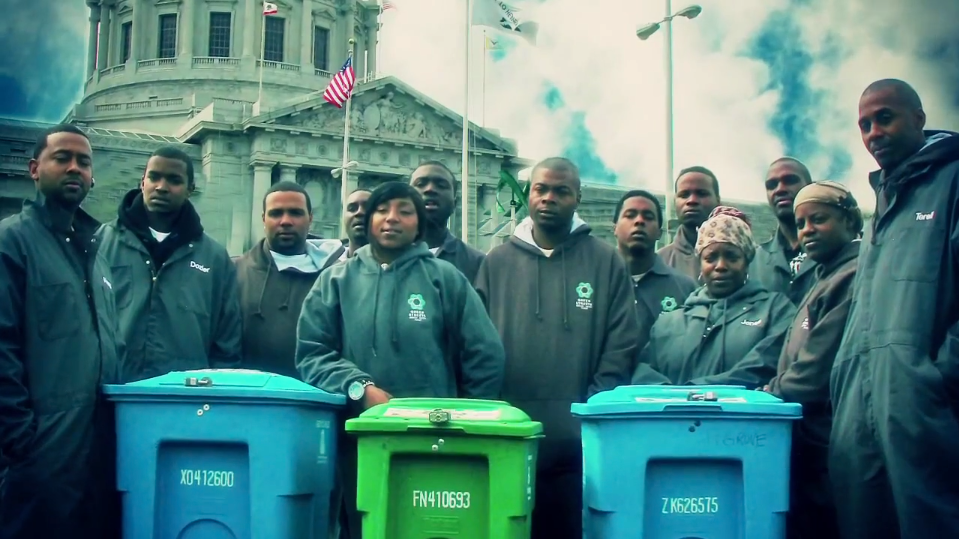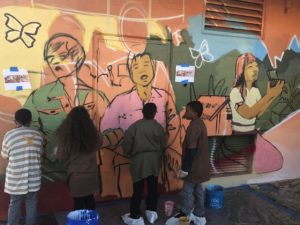Buchanan Mall
Buchanan Mall
This is the story of a business that is much more than a business, and a film that is much more than a film. It begins in 2010, when Tyrone Mullins, a public housing resident in San Francisco’s Western Addition, realized the city’s new zero-waste ordinance could be an opportunity to help the environment while…
Location
San Francisco, California
Partners
Citizen Film and Success Centers
Public Funding Includes
City and County of San Francisco: Grants from departments including Recreation and Parks Department, Department of the Environment, Human Rights Commission, Office of Economic and Workforce Development, Arts Commission, Municipal Transportation Authority, and the City Administrator’s Office
California Arts Council: Creative California Communities grant
National Endowment for the Arts: Our Town
This is the story of a business that is much more than a business, and a film that is much more than a film. It begins in 2010, when Tyrone Mullins, a public housing resident in San Francisco’s Western Addition, realized the city’s new zero-waste ordinance could be an opportunity to help the environment while creating employment for residents. Mullins created a new social enterprise, Green Streets, to handle the recycling and composting at several public housing properties in the Western Addition and to employ residents who, like himself, were returning from incarceration. Citizen Film, a documentary production company, began working with Green Streets on a documentary film to examine how the arrangement affected both the employees and the community. What began as a storytelling project a decade ago has grown into a transformative neighborhood effort.

Photos courtesy of Citizen Film
From the beginning, Citizen Film’s project was not only about documenting, but about helping the Green Streets workers tell their stories, examine their circumstances and envision their futures. “One of the tools we’ve used in storytelling is really listening to young people and getting them to reflect on their story and their aspirations,” explained Citizen Film founder Sophie Constantinou. She believes storytelling can bring people together to confront issues and create solutions. For Citizen Film, this a form of professional development for the Green Streets team members. “The cycle of storytelling is to do the work, then pause to share and reflect on it,” Constantinou said. That reflection naturally encourages growth and change.

Photos courtesy of Citizen Film
Gradually, Citizen Film began reaching beyond personal storytelling. The filmmakers used interviews and storytelling to bring community members together to formulate their vision for what the Western Addition neighborhood could be. Citizen Film worked with Green Streets, the Trust for Public Land, Success Centers and other partners on the effort. The filmmakers helped organize resident meetings, lead planning and visioning exercises, and, naturally, document the process. This task force and residents eventually coalesced around a project to plan a different future for a neighborhood park, Buchanan Mall. Residents viewed the park as unsafe and unwelcoming.
While the task force was leading a public design process, it simultaneously moved forward with activities to beautify the park and make it feel safer. These included aesthetic improvements and physical infrastructure like improved lighting. The formal redesign of the park is now included in a bond on the November ballot. The partners hope the first phases of renovation will begin in 2021.
The Buchanan Mall project goes beyond physical revitalization, however. “We are starting to imagine the public space coming alive,” Constantinou said, “but at its core, it has to have job creation and workforce development.” These functions will keep jobs within the community to support the livelihoods of local residents. Citizen Film partnered with Success Centers to serve as the critical anchor for this work in the neighborhood. Success Centers provides education programs, workforce development, life skills, arts classes and community meeting space for the Buchanan Mall task force. It recognizes that arts provide an effective way to approach education and professional skill development and ties the arts into all of its work.

Photos courtesy of Citizen Film
Citizen Film funded its early work in the community in a “scrappy, catch-as-catch-can way,” Constantinou said. The organization applied for and received a myriad of small city, county and private grants. An ArtPlace America grant in 2014 was a “game-changer,” according to the organization, enabling it to expand beyond the small subset of residents it was working with and scale up its community engagement work. With this experience and momentum under its belt, Citizen Film has more recently begun to access state and federal dollars, receiving a Creative California Communities grant last year from the California Arts Council to create six short films about local microentrepreneurship around Buchanan Mall. Citizen Film also won a 2020 National Endowment for the Arts Our Town grant for a film about the Mall, on its third application attempt.
Constantinou believes the experience of applying for funds at the city and county level translates well to the process of seeking state and federal funding. The process required Citizen Film to identify its role within a larger community context, refine its story, and work closely with partners. “As a documentary production company, we find ourselves in a strange situation because there are narrow avenues for funding,” she explained, but “we are able to be more expansive in how people think about our work. It’s not just film, but thought partnership, storytelling and community organizing.”
The park renovation is estimated to cost $25 million, far more than Citizen Film and Success Centers themselves will raise, and encompasses different, seemingly unrelated funding sources. Community engagement, however, is a common thread throughout all of the project’s stages and sources. Citizen Film and Success Centers are able to work with partners to craft a place for community engagement and storytelling into larger grants. Similarly, Success Centers integrates the arts into its workforce and education programming funded with conventional sources. “Arts is a big component of what we do, but a small part of our budget,” said Liz Jackson-Simpson, Success Centers CEO.
“The creative placemaking frame asks the artist to be outside the arts frame,” Constantinou said of the need to fit her work into broader contexts. “The community development deliverables are much bigger than the art ones.”

